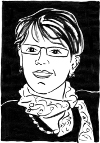 A friend of mine posted on Facebook the other day that she was feeling a bit low. I know that a friend of hers is seriously ill, and I thought it might be because of that. But when I rang her a couple of days later, she said she had been down in Gloucester looking out for badgers at night, and that she always feels a bit blue for a couple of days when she gets home from being out on anti-badger cull duty. ‘I think it’s because I’ve been out in the dark and the cold, squinting through a night-vision spyglass, and I’m just not that young and robust anymore,’ she said. But I think it’s something else.
A friend of mine posted on Facebook the other day that she was feeling a bit low. I know that a friend of hers is seriously ill, and I thought it might be because of that. But when I rang her a couple of days later, she said she had been down in Gloucester looking out for badgers at night, and that she always feels a bit blue for a couple of days when she gets home from being out on anti-badger cull duty. ‘I think it’s because I’ve been out in the dark and the cold, squinting through a night-vision spyglass, and I’m just not that young and robust anymore,’ she said. But I think it’s something else.
Over a period of three weeks this summer, in late August and early September, I found myself on the frontlines of peace and anti-war action. In August, I was part of a group of people who set up the Action AWE / Trident Ploughshares disarmament camp at Burghfield. In early September, I took part in a blockade at the Occupy DSEI protest to stop the arms fair setting up shop in East London. In between I managed to squeeze in a few days at work each week so as not to use up all my annual leave!
I took care throughout to make sure that I got early nights wherever possible, ate well (OK, perhaps I consumed slightly more chocolate than usual...), didn’t drink alcohol, etcetera.
But nonetheless, afterwards, it was a few weeks before I felt wholly myself again. For a while I felt a bit numb at the edges, a bit emotionally dull, not my usual sparky, imaginative self at all. I was a bit grumpy at home (sorry, everyone), and it took a couple of weekends away doing creative work in a community garden before I felt able to think creatively, and reconnect to my feelings properly.
Unconsciously, I had prepared for those three weeks of action in the summer by putting up emotional defences. But those defences got entrenched in that short time, and it took a while for them to melt away.
Of course, part of the post-action blues is just a kind of coming down from the buzz of taking action. But many activists find that taking frontline action means being closer both physically and emotionally to the reality of the wrong thing that you’re campaigning to change. However little discomfort is involved – the Burghfield camp was pretty cosy it has to be said! – and whether or not it involves unpleasant encounters with the police or other forces of opposition, on the front line, you’re more exposed, you can’t turn away and distract yourself as you can when you’re in an office writing emails and making phone calls, or at home painting banners and knitting lengths of scarf.
We wouldn’t campaign on issues that we didn’t care passionately about, so when we take action, we do so wholeheartedly, making ourselves psychologically vulnerable. So some sort of emotional reaction is inevitable. And it’s like someone once said to me about love: if it doesn’t hurt when your heart breaks, how deeply was your heart involved to begin with?
My badger-protecting friend talked about how she’s realised that, as well as investing in warm thermal underwear and a mini-hot water bottle, she needs to limit how often she does this sort of thing, to make sure she has enough recovery time. She needs to call up friends she can talk to afterwards, not necessarily about the details of the action, but just people who’ll understand and not laugh at her for taking time out of her busy life to hang around on hillsides on cold, wet nights.
My self-care consists of living with other activists, taking action in groups with friends whom I trust, and making my actions as fun and creative as possible. And making sure that we don’t forget to have fun together outside of actions and planning sessions! More widely, we need to support each other to take action by being there as friends for each other, organising solidarity actions such as court support and fundraising events, and publicly supporting each others campaigns through social media, petitions and the like.
Fear of the physical and emotional difficulty of taking action acts as a sort of control, preventing people who aren’t sure about whether or not to do something from getting out there. Through fun and solidarity, we can combat that fear, and encourage each other to be brave and do what we feel we have to do to bring about the nonviolent revolution we’re all working towards.
Topics: Activism
See more of: Diary


